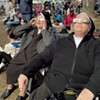Published June 5, 2006 at 6:28 p.m.
Nothing says summer like a concert in the park. For some, that means buying tickets to the Vermont Mozart Festival. But if you're in the mood for a cheaper, more eclectic, albeit somewhat less polished program, you might prefer a performance by one of Vermont's many town bands.
Dozens of communities across the state boast ensembles that play pop songs, marches, ragtime numbers and show tunes, often in the bandstand on the town green. You don't have to buy tickets or make reservations for their concerts; admission is usually free. Not that you have to attend a show to hear them play -- they also appear in parades, at picnics, or at other civic celebrations, such as festivities in honor of Memorial Day or the Fourth of July.
Their performances aren't always the most professional. Few town band members make a living playing music. Most volunteer their time. But if they sometimes hit a few wrong notes, they compensate with an abundance of heart.
Burlington Concert Band musical director Steve Sawyer explains their appeal. His group plays Sundays from 7 to 9 p.m. in the bandshell at Battery Park; their season begins June 18 and ends August 13. "There's something about a concert on a Sunday night next to Beansie's bus," he muses. "There's something very American about it."
Town bands have a long history in Vermont; Burlington's has been around since 1851, though the band's website -- www.burlingtonconcertband.org -- reveals that the music has stopped a few times over the years, most notably when conductor Edward Paige was arrested "on suspicion of embezzlement from the Burlington Railroad" in the 1870s. He was later acquitted.
But Burlington's band isn't the oldest in Vermont -- that honor belongs to the town musicians of St. Johnsbury, whose band was established in 1830. The youngest is perhaps Milton, which formed its ensemble just five years ago, during the summer of 2001.
Michael Sherman, author of Freedom and Unity: A History of Vermont, wrote an essay on town bands that is posted to the Vermont Historical Society's website. He suggests the ensembles were once "training grounds" for rural musicians who went on to careers with traveling orchestras.
The bands also rallied public support during wartime. "During the Civil War," writes Sherman, "many town bands played at recruiting ceremonies, accompanied troops to the local train department and sometimes to the battlefield, and greeted returning veterans . . . During World War I the Montpelier town band played at a gathering of citizens to promote the sale of war bonds. An Italian band in Barre helped send off the young men from that city who were going to war."
*******
Times have changed, somewhat. For example, it's difficult to imagine the cheerful musicians at a recent Burlington Concert Band practice accompanying a National Guard unit to Iraq.
Though the band plays at Battery Park, it rehearses indoors, in the band room at Burlington High School. Their weekly Thursday practices, which started May 11, routinely draw anywhere from 20 to 40 participants of all ages, from ninth-graders to senior citizens.
During their first practice in June, the 17 clarinetists, saxophonists, oboists, horn players and flutist are sitting on black vinyl chairs. The two female percussionists and the stand-up bass player stand in back. The floor is strewn with open instrument cases and small plastic bottles of valve oil. Inspirational portraits of jazz musicians line the walls, along with a poster behind conductor Steve Sawyer that reminds players, "LISTEN and SILENT are spelled with the same letters."
The band is reviewing some of its music for the first time, and most of the pieces sound pretty rough. Sawyer selects songs from the group's library, and the players fish the sheet music from their identical black concert folders. At this rehearsal, they plod through some marches, a Cajun folksong, something called the "American Civil War Fantasy" and the theme from Mission: Impossible.
Sawyer is in his fourth year as the band's musical director. He lives in town and works as a music teacher for grades K-6 at Vergennes Elementary School. "I know 'Lightly Row' and 'Hot Cross Buns' pretty well now," he quips after rehearsal. He says leading the BCB keeps him sharp professionally.
During a run-through of "Dixieland Bash," a ragtime tune, Sawyer stops keeping time with his wooden baton and calls the musicians to a halt. He instructs them to return to a dramatic passage and play it again.
"OK, can we do more rollercoaster?" he asks. "Let's make the audience dizzy right here." Sawyer directs them to the measures in question, and urges them to "crescendo the quarter note on the way to the half note." When the band responds with a hearty wah-wah sound, Sawyer interjects his approval. "Good!" he shouts over the music.
Before they break, the band tries an upbeat classical number, which opens with maracas. After just a few measures, Sawyer butts in.
"Check your rhythm," he stresses. "Da-da-da-da-da-da-da-da, da-da-da-da-da-da-da-da."
When the musicians take a breather, they talk about what motivated them to join the band. They all offer variations on the same answer: "It's fun," observes Mike Berglund, a bass trombone player and mail carrier who lives in Colchester. Berglund is also the band's vice president; though Sawyer is the group's musical director, the band is actually organized by a handful of elected officers.
Norman Carpenter, 66, says the community aspect is what prompted him to pick up his clarinet again and join 10 years ago. "I played all the way through high school and college," says the Burlington resident. "I'm not a very good clarinetist, but I enjoy playing together with other people."
Jean Osbourne, 27, says she's motivated more by the music itself. The trombone player, who lives in Essex Junction, chose her instrument in the fourth grade. Now she teaches Spanish part-time and works at Gardener's Supply Company. The Burlington Concert Band, which she joined in 1998, keeps her tooting her horn.
"I grew up playing music," Osbourne says, "and now music isn't really a part of my life, except for this. It's a way to keep it alive."
None of the band members mentions money as a motivator -- not surprising, since they don't make much. Most town bands receive some municipal funding, and Burlington is no exception. A city accountant confirms that the city has been supporting the band since 1987; this year it will receive $4000. BCB president Ruth Blauwiekel, who plays bass drum, says the city is the band's main source of cash. The BCB also collects performance fees for a handful of concerts it gives in addition to its Battery Park gig.
Blauwiekel reports that the group uses most of the money to buy music and equipment, and to advertise its concerts. Sawyer and the officers also receive honoraria. Whatever is left at the end of the season is split among the band members, depending upon how many concerts and rehearsals they've attended. Blauwiekel says it's a very small amount.
But at least they get something. Most musicians in town bands are volunteers. That's true in St. Johnsbury, where clarinetist Marie-Anne Hemond says concerts attract between 40 and 45 musicians "on a good day."
But Hemond notes that most of those players belong to other area bands in Newport, Barre, Danville or Morrisville. Hemond herself plays bass drum for the Lyndonville Military band. "You find a lot of people play more than one instrument," she says. "You have to. That's how those bands stay alive."
Burlington's Blauwiekel admits she's also thinking about her band's survival. Their musicians are definitely aging; the sole tuba player is likely out for the season after suffering a stroke.
She emphasizes that the BCB is eager to recruit. The band officially requires that members be able to read music, play scales and have at least three years of experience with their instrument, but Blauwiekel says the BCB is very willing to work with ex-musicians who may be a little rusty. At this point it seems like they're looking for warm, somewhat musically inclined bodies.
But Blauwiekel and her fellow town band members are determined to keep the tradition alive. They argue that their music still plays a vital role in Vermont community life by providing accessible opportunities for people to listen to and play live music.
"It's nice when people make music," says Blauwiekel, "even when they don't sound as good as the iPod."
With the Band?
Seems like almost everybody was once, including these local ex-players:
ANDY MONTROLL, Burlington, attorney and city councilor
"My grandmother gave me a violin at birth," Montroll reports. "I started playing it when I was in third grade, and played until I was in ninth grade. Unfortunately, after about fifth grade, I just never got any better. I said, 'All right, that's not one of my talents.'"
GARY MARGOLIS, Burlington, UVM chief of police
Margolis played in the orchestra in junior high and high school. He started playing violin when he was 6 or 7, then switched to clarinet as a teenager. In high school, he switched again: "They needed a bass clarinetist," he says. "Bass clarinets are big instruments, and I'm a big guy."
Margolis remembers playing at pep rallies, sporting events and synagogue talent shows. He quit after high school. "I really miss music," he says. "Someday I'll play again. My fantasy someday is to conduct an orchestra."
MARY HOOPER, mayor of Montpelier
"I was required to take piano lessons," recalls Hooper. "I had a kind of typical response to that. It didn't do much for me. Of course, now I wish I could play the piano."
As an adult, Hooper took up the recorder. She played in an ensemble until about a year into her tenure as mayor, when she got too busy. But she says she hasn't given up music entirely. "The music stand's still set up in the living room," she reports.
When talking about her new instrument choice, Hooper sounds a defensive note. "A lot of people think the recorder is a kid's toy, but it's a real instrument," she says. "It really is."
PAMELA POLSTON, Winooski, co-publisher/editor of Seven Days
At the beginning of seventh grade in Omaha, Polston chose to learn the trombone, but she soon grew discouraged by the excess of boy trombonists in the school band, which included grades 7 to 12. The director suggested she switch to tuba, since the sole player was about to graduate. For the next six years, she played a white fiberglass sousaphone that weighed 15 pounds. "I hated marching season," she recalls.
Polston, who years later in Burlington became the lead singer for The Decentz, says she enjoyed playing the oversized instrument and wishes she had kept it up after high school.
But there was one good reason not to: She shares a memorable moment, when she blew a capped front tooth into her mouthpiece. Her band teacher flushed out the horn, but the tooth never emerged. She had to have it replaced. "It was very embarrassing," she says.
But not as embarrassing as the second time it happened.
Observes Polston, "It's probably still rattling around in there to this day."
KEN SQUIER, Stowe, owner of WDEV and co-owner of Thunder Road Speedbowl
Squier played clarinet at Waterbury High School. "They had a guy come with instruments to the high school," he remembers. "He played the clarinet in the low register, and I thought it was beautiful."
The stock-car announcer says he quit clarinet after graduation. Why? "Probably I went deaf racing."
Any funny band stories? "I was not good," he admits. "I'm sure that anyone who listened to me play thought it was funny."
More By This Author
Speaking of...
-

Q&A: Catching Up With the Champlain Valley Quilt Guild
Apr 10, 2024 -

Video: The Champlain Valley Quilt Guild Prepares for Its Biennial Quilt Show
Apr 4, 2024 -

Q&A: Digging Into the Remnants of the Ravine That Divided Burlington
Mar 27, 2024 -

Video: Digging Into the Ravine That Divided Burlington in the 1800s
Mar 21, 2024 -

Q&A: Repairing a Historic Smokestack From a Floating Basket
Nov 22, 2023 - More »
Comments
Comments are closed.
From 2014-2020, Seven Days allowed readers to comment on all stories posted on our website. While we've appreciated the suggestions and insights, right now Seven Days is prioritizing our core mission — producing high-quality, responsible local journalism — over moderating online debates between readers.
To criticize, correct or praise our reporting, please send us a letter to the editor or send us a tip. We’ll check it out and report the results.
Online comments may return when we have better tech tools for managing them. Thanks for reading.














































